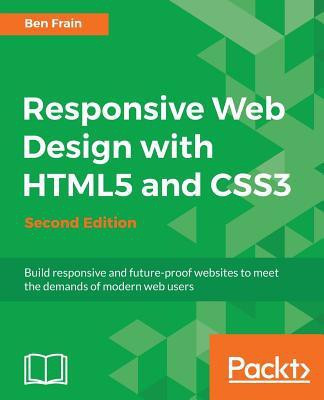Responsive Web Design with HTML5 and CSS3 -(English, Electronic book text, Frain Ben)
Quick Overview
Product Price Comparison
Learn the HTML5 and CSS3 you need to help you design responsive and future-proof websites that meet the demands of modern web usersAbout This Book* Learn and explore how to harness the latest features of HTML5 in the context of responsive web design* Learn to wield the new Flexbox layout mechanism, code responsive images, and understand how to implement SVGs in a responsive project* Make your pages interactive by using CSS animations, transformations, and transitionsWho This Book Is For Are you writing two websites - one for mobile and one for larger displays? Or perhaps you've already implemented your first 'RWD' but are struggling bring it all together? If so, Responsive Web Design with HTML5 and CSS3, Second Edition gives you everything you need to take your web sites to the next level.You'll need some HTML and CSS knowledge to follow along, but everything you need to know about Responsive Design and making great websites is included in the book!What You Will Learn* Understand what responsive design is, and why it's vital for modern web development* HTML5 markup is cleaner, faster, and more semantically rich than anything that has come before - learn how to use it and its latest features* Integrate CSS3 media queries into your designs to use different styles for different media. You'll also learn about future media queries which are evolving in CSS4.* Responsive images allow different images to be presented in different scenarios. We'll cover how to load different sets of images depending upon screen size or resolution and how to display different images in different contexts.* Conquer forms! Add validation and useful interface elements like date pickers and range sliders with HTML5 markup alone.* Implement SVGs into your responsive designs to provide resolution independent images, and learn how to adapt and animate them* Learn how to use the latest features of CSS including custom fonts, nth-child selectors (and some CSS4 selectors), CSS custom properties (variables), and CSS calcIn DetailDesktop-only websites just aren't good enough anymore. With mobile internet usage still rising, and tablets changing internet consumption habits, you need to know how to build websites that will just 'work', regardless of the devices used to access them. This second edition of Responsive Web Design with HTML5 and CSS3 explains all the key approaches necessary to create and maintain a modern responsive design.The changing way in which we access the web means that there has never been a greater range of screen sizes and associated user experiences to consider. With these recent trends driving changes in design, typical desktop-only websites fail to meet even minimum expectations when it comes to style and usability, which can be vital when your website is central to yours or your client's brand. Responsive Web Design with HTML5 and CSS3, Second Edition is an updated and improved guide that responds to the latest challenges and trends in web design, giving you access to the most effective approaches to modern responsive design.Learn how to build websites with a "responsive and mobile first" methodology, allowing a website to display effortlessly on every device that accesses it. Packed with examples, and a thorough explanation of modern techniques and syntax, Responsive Web Design with HTML5 and CSS3, Second Edition provides a comprehensive resource for all things 'responsive'.This updated new edition covers all the most up-to-date techniques and tools needed to build great responsive designs, ensuring that your projects won't just be built 'right' for today, but in the future too.Chapter example code is all hosted on rwd.education, a dedicated site for the book, built by the author, using the approaches and techniques championed throughout.Style and approachThis book should be useful in two ways: as a 'read from the beginning and learn as you go' resource but also as a reference you can come back to in the months to come - when trying to remember this or that syntax or look up a link that may help you out of a development hell-hole.To this end, rather than follow a single design through from chapter one and build on it incrementally until the end of the book, each chapter exists in relative isolation.This means that code and examples are particular to each chapter and don't need to be considered along with what has gone before or after.That doesn't mean that each chapter's techniques won't work in unison; the reference site for this book, rwd.education is an example of them all working in harmony.However, by limiting the chapter examples to the topic at hand, it should be simpler for you to understand and reference the essence of each example and topic in the future.


